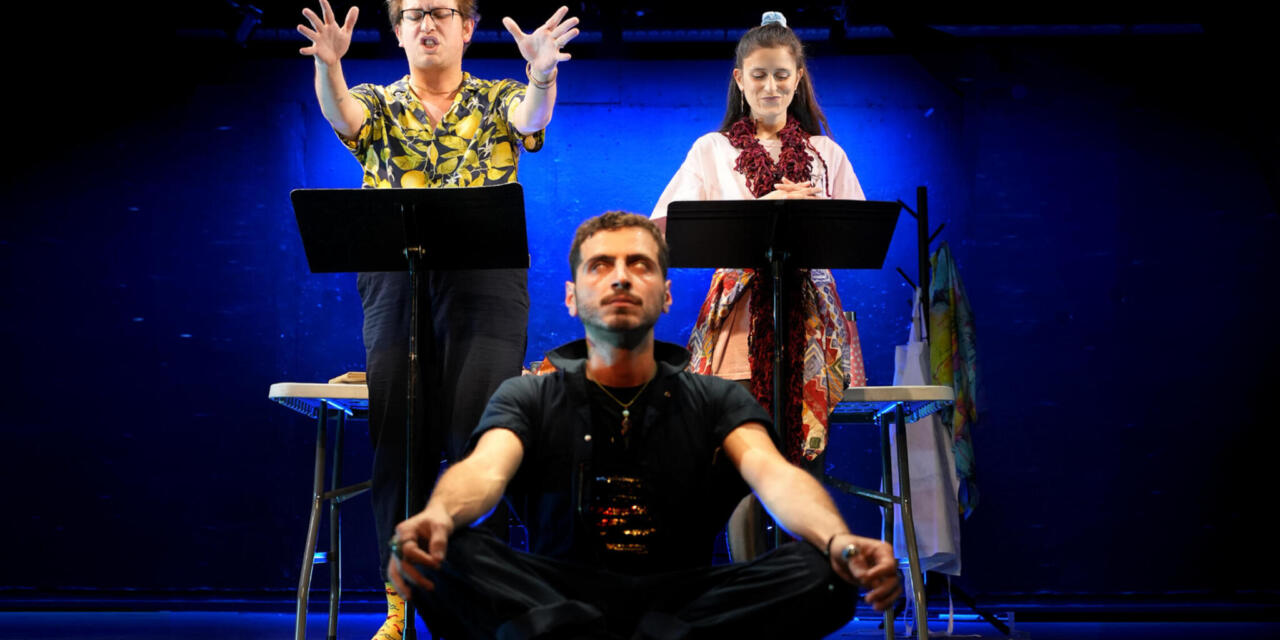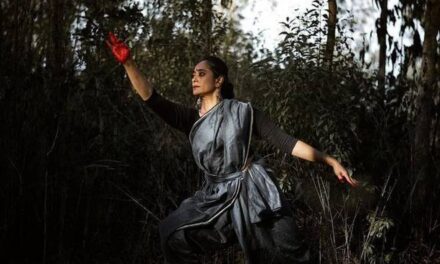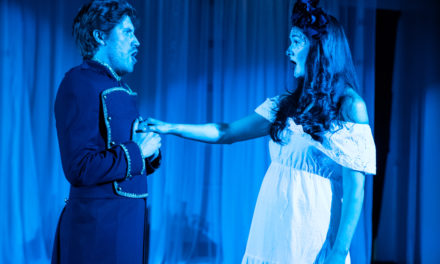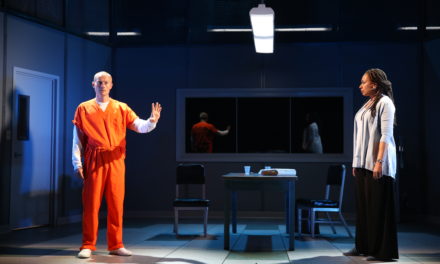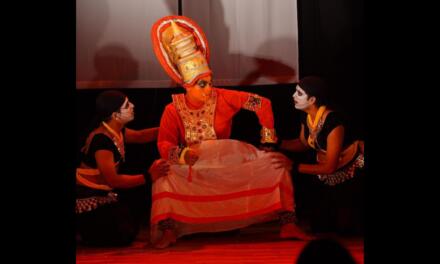“The Aliens Make Thanksgiving Dinner” is a new devised play, co-written, co-directed and performed by James Clements (Scotland), Derya Celikkol (Turkey) and Maamoun Tebbo (Lebanon), and helmed by an all-immigrant artistic team. Inspired by its creators’ personal stories and experiences, the piece follows three immigrant artists’ efforts to create the next “Great American Play” under the joint pressures of theatrical commission and their precarious Visa statuses. Gathering in an empty theatre on Thanksgiving night to develop the play, the artists struggle to bridge the gap between their own cultural identities and their place in American theatre and society. As they cook, play, and talk, food and theatre become metaphors for connection, survival and the never-ending creative process. This absurdist meta-theatrical play-in-process raises prescient questions about the American theatre – and American life – through the eyes of those on its fringes.
The play made its NYC and live-streamed world premiere from June 10-12, 2022 as part of Rattlestick Theater’s Global Forms Festival, an annual summer theater festival centered on cross-cultural dialogue and new work by immigrant artists. I spoke to the piece’s co-creators about the show’s themes and development process, as well as the struggles and triumphs of creating new work as immigrant artists in the USA.
1) What inspired you to create this piece, and why did you choose its particular format? How do you feel its meta-theatricality impacts the overall message?
James Clements: This piece really just sort of sprung out of us all, to be honest. It really is the conversations we were having all the time with friends and collaborators, the issues keeping us up at night, the anxieties of being an immigrant creative. It was truly all there. We just needed to mine it, and put it in a structure. The idea of a play-within-a-play, unpacking the creative process, which is inherently unruly and non-linear, felt like the best way to engage with the emotional chaos of the immigrant experience: the frustrations, the contradictions, the moments of hypocrisy. It was a very freeing structure. The meta-theatricality removed the expectation of a clear answer to these sort of epic questions, which none of us pretend to have.
Mamoon Tebbo: I met James through last year’s Global Forms Theatre Festival. When we came together with Derya to co-create for this year’s festival, we wanted to write something about the current conversation in the theatre industry through the lens of immigrant artists. The fact that we come from diverse backgrounds and performed our personal stories gave the work a metaphysical aspect. The lines between our personal lives and acting a character on stage were blurred, and the veil of separation became thinner, making the overall message or story more accessible to the audience.
Derya Celikkol: Our personal experiences as immigrant artists in New York inspired us to investigate what it means to make art in a country and culture that is not ours. I feel like the format chose us, not the other way around. We had a lot of writing sessions where we discussed and wrote about relevant themes and after some time, we selected our favorite segments from these sessions, put them in order and wrote transitions in between that reflected our conversations in the writing process. Since the themes we chose to write about in the beginning of the process were so close to home for us, it doesn’t surprise me that we ended up playing exaggerated versions of ourselves in our meta-theatrical rehearsal room. I think this added an extra layer of authenticity to the play. It also created an intimacy between us and the audience where the issues we discussed on stage felt very real and not performative.
2) How did you develop the show and create individual scenes?
JC: We would have writing jams probably once a week for about two months, just generating, generating, generating. We would take turns bringing in prompts and facilitating them for one another – poetry exercises, source-based writing prompts, character improvisations, you name it. We knew there were certain core topics we wanted to consider through a specifically immigrant lens – love, creativity, heritage – but, otherwise, we really tried to follow the natural impulses as they came.
MT: The storytelling of the show was fundamentally influenced by our views and how we see American culture. The process was extremely fluid and organic. We came together discussing our intentions and aspirations from this collaboration, as well as our shared experiences, our political opinions and the standard “great American stories.”
The play became a collage of thoughts and ideas shared between us, portraying the struggles [of immigrants] in a strange and absurd way. Our dramaturgical timeline was intentionally portraying a process from mind to emotions to the spirit of the community.
DC: We weren’t trying to force a play to come out, our eyes weren’t on the finished product and what mattered the most was exploring the themes we chose as deeply as possible. From our sessions we chose certain pieces and put them in an order together. Then we all individually wrote different transition sections between these scenes which were the rehearsal room discussions and we edited everything together. Once we were up on our feet and rehearsing, we realized that some of the longer wordy speeches and dialogues took away from the flow of the play so we cut down the play a lot until we found the right rhythm.
JC: At the end, we sat for two painstaking five hour sessions and got it into some type of shape and structure. The cutting was brutal, but cathartic. Then, within the first week of rehearsal, we had cut about another fifth of the script, shepherded by our amazing stage manager, Jo, who was infinitely patient with us. There was just a lot of repetition but, because it is so personal, we struggled at moments to see that as we were creating. So the editing process was a hell of a ride.
3) “The Aliens” reflects your joint and individual stories as immigrant artists. What have been some of the biggest challenges and triumphs of working collaboratively? Where do personal and shared experiences overlap or diverge?
DC: Our creative differences were both the biggest challenge and the biggest triumph in our process. It was difficult to get used to each other’s way of working and even thinking but our differences also helped us create a very unique play that is a true amalgamation of our minds.
MT: Our different backgrounds, country of origin, ethnicity, gender, and system of beliefs and habits fundamentally shape the way we individually experience our immigrant experience.
It is interesting to learn that this shared experience is integrated and experienced differently among the collaborators based on their individual and unique conditioning.
Despite the overlaps this shared experience presents, other social factors and how we individually identify showed up in our conversation and exchange, influencing the storytelling of this work and our dynamics.
JC: The biggest triumph, for me, was the triumph of community. We truly wrote this, performed this and directed this as a trio – a challenging but exhilarating container we placed on our process. So, for me, just holding space where we understood one another on a fundamental, inherent level – despite the obvious differences in our trajectories – was really powerful. I think the challenges were in that overlapping space between the “real” us and the characters. There were certain lines that, when it came time to start really performing, made us each uncomfortable, or on the other end of the spectrum, that we fought to include even though they maybe weren’t necessary. It was just so intensely personal, it was hard to seperate. But we got through it with compassion and empathy – most of it anyway!
4) A big theme of the show is authenticity versus performativity, especially as it relates to the public sharing of one’s experiences. How does that come up in playing versions of yourselves onstage? Do you find any distinctive differences between your onstage and “real life” personas?
DC: This is a little tricky to dissect, because as an actor I aim to find authenticity in every character I play, no matter how different they are to me. So the lines between my authentic self and the authenticity I created for the character of Derya are very blurred. There were definitely certain lines that I wouldn’t really say in my real life that we put in the play to either emphasize something or to move the story forward. This was an interesting tension as we had to struggle between not wanting to represent ourselves in a dishonest way and keeping the integrity of the play.
MT: For me as an artist this is the main theme of exploration in this work. It is the dance between what is real and what is performative. The fact that we wrote and acted our own words, ourselves, opened my eyes to the relationship between the many different aspects of myself: myself as a whole (the witness), my persona (the character; how I act in the world), the person I am in private and the person I am in a group or community.
In this work, I did not try to act. My character was me: an artist who’s trying to explore and redefine things by pushing the boundaries of theatre, and merging it with live performance and improvisation.
JC: I think all three of us heightened the natural personality traits and creative tics we have, kind of without even speaking about it. We had a real exchange of energy, and I think did a strong job of meeting one another where we were on stage. It was tough when there was content or ideas the dramaturgy required that each of us don’t personally believe, but we took the time to talk through it, and remind one another it was a performance. But then – during rehearsals and tech – our team delighted in pointing out when the fictional dynamics really played out in the room, more than once. That was pretty trippy. A real lesson in knowing yourself.
5) How, if at all, do you feel being an immigrant artist in the US has changed within the current political landscape (post-2020, widening partisanship, etc)?
DC: The pandemic made me realize the borders between countries are more restrictive than I thought. This made the distance between Turkey and the USA seem farther in my perception.
MT: After 2020, it became clear for me that being an immigrant artist in the United States is a label that comes with its benefits and prices. It is definitely challenging to transition from one country to another, [and] more challenging to be integrated into the landscape of theatre here, especially since our industry is fundamentally based on connection and word of mouth. The limitations that our O1 visa comes with makes it more challenging to grow and expand.
JC: To be honest, I don’t feel like it has shifted that much. This administration didn’t reduce the cost of the [visa] process from any of the Trump increases, and the application remained as treacherous as ever when I renewed my O1 in 2021. So I don’t necessarily feel more supported than before. But I wouldn’t say it is worse either. It’s just – the longer you do it, the more you learn the game, and how it works. But it’s still a f–ing labyrinth.
6) Where do you see this piece going after its Global Forms Festival run? Would you expand upon it or adapt it in any way?
DC: From all the incredible feedback we got from the people who saw the show, I know that the things we talk about in the play are things a lot of people are yearning to hear and I would love to do a longer run with some updates and revisions and bring this conversation into more people’s lives.
MT: I think the Global Forms Festival run was our first experiment to puting the work on stage and see how it would be received. The work could use a new round of editing and sharpening to make it accessible not only for immigrants but everyone. Specifically, that we [could] tackle topics such as race, gender, sexual orientation, colonization, patricarchy and feminism. This work could evolve from a specific space into a universal message, while emphasizing on the role of arts and today’s artists in the evolution of our society.
JC: There are lots of exciting avenues it could go down. Everyone who developed it was also an immigrant artist (Luis Marciliano (Brazil) for set and props, Nori Hung (Hong Kong) for sound, Dan Wang (China) for costumes, Alexandra Vásquez Dheming (El Salvador) for lights, Zeynep Akca (Turkey) as Assistant Director and Hany Osman (Egypt) as photographer), so it feels like the ensemble we built is super tight and focused, which is key for any next steps with devised work. Everyone is telling the same story, if that makes sense. So I think it is about finding the right home and infrastructure to continue to develop, to play, to explore. The framework is there, but it was a workshop production. There is still growth to do. We also talked about adding a director to the team, but are undecided. We are trying to stay really open, and follow impulses. It has been the energy of the piece so far, and we want to honor that.
7) What takeaways do you hope audience members will leave with?
MT: I would like the audience to question the concept of identifying with all the different labels our society and system enforces on us. I would like them to leave knowing that the space of unity that we all can find, despite [our] differences, is the desire to connect and try to build a new narrative and understand each other without baggage or hate.
DC: This is something that was very clear in my mind since we first started to work on the play: I want immigrant folks to feel seen, represented and valued. And I want the American audience to get a glimpse of our lives as immigrant artists in the States.
JC: For immigrant audiences…we hope it’s validating, and that we are presenting their reality back to them in a heightened way. For American citizens, I hope we (gently, lovingly) puncture any sense of American exceptionalism that remains in 2022. I’m not interested in branding trauma, but I am interested in engendering a sense of empathy, and I hope that is what this piece achieves. And, for anyone watching, I hope the piece reminds us to take a real interest in others, what they can teach us and what we can learn from them. That feels like a core purpose of the theatre to me.
This post was written by the author in their personal capacity.The opinions expressed in this article are the author’s own and do not reflect the view of The Theatre Times, their staff or collaborators.
This post was written by Emily Cordes.
The views expressed here belong to the author and do not necessarily reflect our views and opinions.

